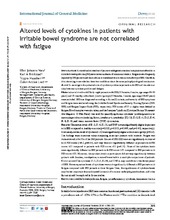Altered levels of cytokines in patients with irritable bowel syndrome are not correlated with fatigue
Peer reviewed, Journal article
Published version

Åpne
Permanent lenke
https://hdl.handle.net/1956/19664Utgivelsesdato
2018-07-06Metadata
Vis full innførselSamlinger
Originalversjon
https://doi.org/10.2147/ijgm.s166600Sammendrag
Introduction: A considerable number of patients with gastrointestinal complaints attributable to irritable bowel syndrome (IBS) have shown evidence of immune activation. Fatigue is also frequently reported by IBS patients and the condition is considered as a common comorbidity of IBS. Therefore, it is interesting to see whether these two conditions share the same pathophysiological mechanism. Aims: To investigate the potential role of cytokine profiles in patients with IBS and the relationship between cytokine profiles and fatigue. Materials and methods: Thirty-eight patients with IBS (32 females, 6 males, age range 18–70 years) and 22 healthy individuals (control group) (17 females, 5 males, age range 24–42 years) were included. IBS was diagnosed according to Rome III criteria, and severity of IBS symptoms and fatigue were evaluated using the Irritable Bowel Syndrome-Severity Scoring System (IBS-SSS) and Fatigue Impact Scale (FIS), respectively. FIS scores of 25 or higher were defined as fatigue. Blood samples were also taken, and the Luminex® platform (Cytokine Human Ultrasensitive Magnetic 10-Plex Panel) was used for quantifying human cytokines’ profile (granulocyte-macrophage colony-stimulating factor, interferon-γ, interleukin [IL]-1β, IL-2, IL-4, IL-5, IL-6, IL-8, IL-10, and tumor necrosis factor [TNF]-α) in serum. Results: The serum levels of IL-5, IL-6, IL-10, and TNF-α were significantly higher in patients with IBS compared to healthy controls (p=0.003, p=0.011, p=0.007, and p=0.02, respectively). Conversely, serum levels of cytokine IL-1β were significantly higher in the control group (p=0.03). The findings were consistent when comparing nonatopic patients with controls. Fatigue was demonstrated in 84.2% of the IBS patients. Scores of IBS-SSS were not significantly correlated with FIS scores (r=0.2, p=0.19), and they were not significantly different in patients with FIS scores >25 compared to patients with FIS scores <25 (p=0.11). None of the cytokine levels were significantly different in IBS patients with FIS scores >25 compared to IBS patients with FIS scores <25. Moreover, the cytokine levels in participants did not vary significantly between patients with diarrhea, constipation, or mixed bowel habits in multiple comparisons of patients. Conclusions: The cytokines IL-5, IL-6, IL-10, and TNF-α may contribute to the development of IBS. However, serum levels of cytokines were not significantly different in IBS patients with fatigue compared with IBS patients without fatigue. Thus, the significance of cytokine levels may be less important than anticipated in search of common underlying mechanisms, and other factors should be explored in future studies.
